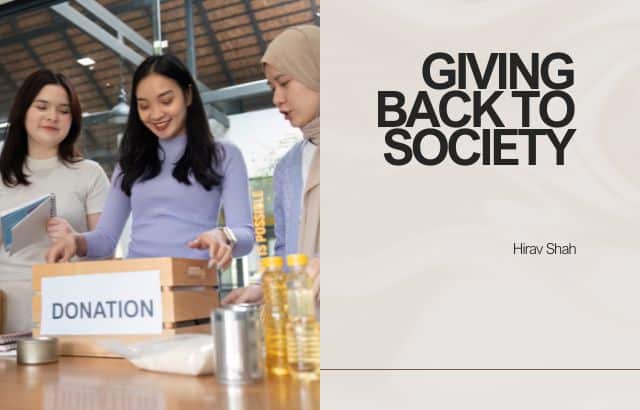Giving back to society can have a transformative impact on your life, both personally and professionally. Volunteering your time, sharing your skills, or donating resources doesn’t just help those in need; it also enhances your own well-being. By making a positive difference in the lives of others, you open the door to personal fulfillment, new connections, and a sense of purpose. The notion of giving back is deeply embedded in our human nature, and when embraced, it can create lasting positive changes in both the giver and the recipient.
Table of Contents
“We make a living by what we get, but we make a life by what we give.”
— Sir Winston Churchill
This powerful quote from Winston Churchill encapsulates the true essence of giving back. It’s not just about what we acquire for ourselves, but what we contribute to the lives of others that defines the richness of our life. Giving can take many forms, from a simple act of kindness to a significant financial contribution. No matter the form, the act of giving is transformative. As noted business strategist and Game Changer Hirav Shah explains, the more you give, the more you enrich your own life, motivating you to continue contributing to the world around you.
The Significance of Rewarding Society
Why is giving back to society so important?
In today’s world, where personal success is often measured by financial or professional achievements, we may lose sight of what truly matters—the connections we share with others. Giving back serves as a reminder that life’s true meaning is created not from what we acquire, but from the impact we have on others’ lives.
Hirav Shah highlights that, as humans, we inherently need to connect with others during both the good and bad times. Whether it’s sharing good news or seeking emotional support during challenging moments, our need for connection is integral to our well-being. Just as we rely on others, it’s equally important to offer support and love when others need it. By rewarding society, we help build stronger communities and create an environment of mutual support and care.
The Role of Business Strategists in Giving Back
Business strategists, like Hirav Shah, understand that giving back isn’t just about charity—it’s about making smart, sustainable decisions that align personal or professional goals with societal good. Here’s how business strategists influence and encourage giving back:
- Corporate Social Responsibility (CSR): Business strategists often guide companies to develop CSR programs that positively impact society. For example, a company may allocate a portion of its profits to fund educational programs, healthcare initiatives, or environmental sustainability projects. When organizations incorporate giving back into their core strategies, it not only improves the community but also boosts the company’s image and brand loyalty.
- Philanthropy in Business: Business strategists understand the long-term benefits of philanthropy. Take the example of Bill Gates, who through the Bill & Melinda Gates Foundation, has donated over $30 billion to improve healthcare and reduce poverty globally. Companies like Microsoft often contribute their resources and expertise to societal causes, creating a ripple effect that inspires others to give as well.
- Employee Engagement: Business strategists emphasize the importance of employee engagement in community-driven projects. Companies like Salesforce encourage their employees to volunteer by offering paid volunteer days. This creates a culture of giving within the organization, which not only benefits the community but also boosts employee morale and retention.
Why Giving Back to the Community Matters
- Creating Meaning: Life is about creating meaning, and the best way to do that is through acts of kindness and generosity. It’s not about what you accumulate but the legacy you leave behind. When you give to others, you create a lasting impact, both on the people you help and on yourself.
- Strengthening Community Bonds: Giving back creates stronger, more resilient communities. Whether it’s donating money, time, or skills, your efforts can uplift others and build a sense of shared purpose.
- Boosting Personal Well-being: Studies show that giving back reduces stress, increases happiness, and improves mental health. The simple act of helping others triggers the release of oxytocin, the “feel-good” hormone, and can improve overall life satisfaction.
Practical Strategies for Giving Back
1. Find Your Purpose
The first step in rewarding society is to find your purpose. What motivates you? Is it financial security, recognition, or making a difference? When you align your actions with a greater cause, you’re more likely to feel fulfilled.
For example, Oprah Winfrey, known for her philanthropic endeavors, created the Oprah Winfrey Foundation, which funds initiatives related to education and women’s rights. Her passion for education led her to contribute millions to improving schools in underserved areas.
2. Start Small and Start Today
You don’t need to wait until you have more money or time to make a difference. Start with small acts—helping a neighbor, volunteering at a local shelter, or donating a portion of your income. Every small contribution counts, and over time, it adds up.
Hirav Shah believes that whether you’re earning $30,000 or $1 million, your ability to contribute isn’t defined by your wealth but by your mindset. If you’re not giving back now, you probably won’t even when you become more successful.
3. Create a Ripple Effect
Every act of kindness creates a ripple. Think of individuals like Serena Williams, who regularly donates to causes supporting youth sports and education. Her influence has inspired many others to contribute to similar causes. When you give, you inspire others to do the same.
Start by getting involved in a cause you care about and encouraging friends and colleagues to join you. The more people you involve, the bigger the impact you’ll have.
4. Find What Fits
Not every cause will resonate with you, and that’s okay. Find what excites you, whether it’s helping animals, supporting local schools, or working towards environmental sustainability. If you’re passionate about something, it will be easier to dedicate your time and resources.
For example, Patagonia, the outdoor apparel company, donates a percentage of their profits to environmental causes. Their commitment to the environment aligns with their brand ethos, proving that giving back can be both meaningful and aligned with business goals.
5. Embrace Your Life as a Resource

You don’t have to be a billionaire to make a difference. Your unique life experiences, skills, and perspective are invaluable resources you can share. Whether it’s mentoring a young professional or volunteering at a local shelter, your time and knowledge can make a significant difference.
Frequently Asked Questions (FAQs)
Q1: Do I need a lot of money to give back to society?
No, giving back doesn’t always require financial contributions. Volunteering your time, offering your expertise, or helping someone in need are all valuable forms of giving.
Q2: How can a business contribute to society?
Businesses can give back through corporate social responsibility (CSR) initiatives, donations to charitable causes, employee volunteer programs, or sustainable practices. These actions not only help society but also build a positive brand image.
Q3: What are some small ways to give back?
Small acts include donating used items, helping a neighbor with groceries, volunteering at a local shelter, or simply being there for someone going through a tough time.
Q4: How can giving back impact my personal life?
Giving back enhances your sense of purpose, builds connections with others, and contributes to your mental well-being. It’s been shown that those who give are often happier and more satisfied with their lives.
Q5: How do I stay motivated to keep giving back?
Reflect on the positive impact you’ve made and the people you’ve helped. You can also get inspired by the actions of others and stay connected with like-minded individuals who share your passion for giving.
Final Thoughts

Hirav Shah puts it simply: “Walking the path of happiness is easier than you think. The next time you find a small bill in your pocket, don’t just buy something for yourself. Use it to help someone else.”
The act of giving back can be as simple as dedicating a small portion of your time, energy, or resources to make someone else’s life better. When you reflect on your own motivations and explore ways to contribute to society, you’ll discover that giving back is not only a reward for others but for yourself as well. Start small, stay committed, and watch the ripple effect grow.

















